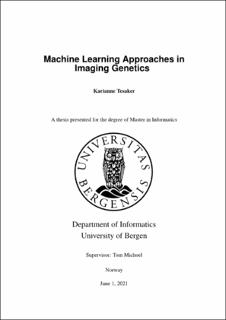| dc.contributor.author | Tesaker, Karianne | |
| dc.date.accessioned | 2021-09-09T23:55:29Z | |
| dc.date.available | 2021-09-09T23:55:29Z | |
| dc.date.issued | 2021-06-01 | |
| dc.date.submitted | 2021-09-09T22:00:11Z | |
| dc.identifier.uri | https://hdl.handle.net/11250/2775027 | |
| dc.description.abstract | Established approaches in imaging genetics and genome wide association studies (GWAS) such as univariate, multivariate and voxel-wise approaches, are prone to certain disadvantages such as being computationally expensive, selection of imaging phenotypes (IPs) requiring knowledge of which features are relevant for the task, and/or that relationships between different IPs are lost. In this thesis, uses of Random Forest Classification (RFC) and Convolutional Neural Networks (CNNs) within imaging genetic studies of magnetic resonance imaging (MRI) and genetic data from the Alzheimer’s Disease Neuroimaging Initiative (ADNI) database, have been investigated, with the hope of addressing the issues of the established approaches. CNNs were found to be a possible powerful tool in assessing which brain areas are affected by specific single nucleotide polymorphisms (SNPs). | |
| dc.language.iso | eng | |
| dc.publisher | The University of Bergen | |
| dc.rights | Copyright the Author. All rights reserved | |
| dc.subject | Deep Learning | |
| dc.subject | Densely Connected Convolutional Networks | |
| dc.subject | Imaging Genetics | |
| dc.subject | Genome Wide Association Studies | |
| dc.subject | Machine Learning | |
| dc.subject | Random Forest Classification | |
| dc.subject | Convolutional Neural Networks | |
| dc.subject | Alzheimer's Disease | |
| dc.title | Machine Learning Approaches in Imaging Genetics | |
| dc.type | Master thesis | |
| dc.date.updated | 2021-09-09T22:00:11Z | |
| dc.rights.holder | Copyright the Author. All rights reserved | |
| dc.description.degree | Masteroppgave i informatikk | |
| dc.description.localcode | INF399 | |
| dc.description.localcode | MAMN-PROG | |
| dc.description.localcode | MAMN-INF | |
| dc.subject.nus | 754199 | |
| fs.subjectcode | INF399 | |
| fs.unitcode | 12-12-0 | |
